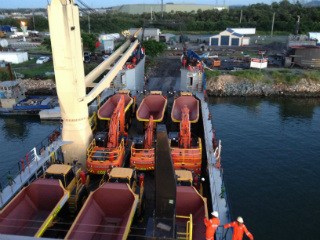Papua New Guinea’s coastal shipping sector acts as a barometer for the country’s broader economy. While there has been a 25 per cent drop in volumes in the past year, Bismark Maritime Chief Executive Jamie Sharp tells Business Advantage PNG the market is now flattening out.

Bismark Maritime’s liner service. Source: Bismark Maritime.
‘Between this year and last year there has been about a 25 per cent drop in freight,’ observes Bismarck Maritime’s Chief Executive Officer Jamie Sharp.
The downturn that is detected by Bismark correlates with what is happening with its customers’ businesses, says Sharp.
‘A lot are saying that they are experiencing that kind of drop in sales.
‘We are linked to the rest of the economy; we are a barometer.
‘Sharp does not expect the current trends to change unless there is a bounce back in the economy.’
If our customers are down by 25 per cent that will reflect on what they ship.’
‘The good news from our perspective is that it is quite stagnant,’ he notes, suggesting that the fall in volumes is coming to an end.
Sectors

Bismark Maritime’s Jamie Sharp
Sharp says oil and gas are the weakest sectors, along with ‘any project cargo’. But he is confident that food and beverage shipments will not fall any lower. ‘People have to eat. That is relatively consistent this year.’
He does not expect business to pick up unless there is a bounce back in the economy. ‘From what I hear, things will remain the way they are until some time after the elections next year.’
‘The pie is only so big. It only supports as many providers as that allows.’
So how is the company responding to the more difficult circumstances? Sharp says the strategy is to reduce costs and ‘go hard to pick up whatever market share we can in a depressed market.’
Rationalisation

Coastal shipping vessel
Sharp does expect some rationalisation in the shipping industry.
‘In this situation, what happens is it can cause a situation where there are fewer competitors in the market.
‘The pie is only so big. It only supports as many providers as that allows.
‘There is Elk Antelope–they expect to kick that off at some stage late next year.’
‘This time three years ago, there were quite a number of companies and transport companies around but now there are fewer.
On line
Sharp says projects that are expected to come on line after the election will have a beneficial effect on activity.
‘There is Elk Antelope [Papua LNG]—they expect to kick that off at some stage late next year. That will be good for the economy. There are a few other projects that are going on in the islands as well; I think they are expected to come on line after the election.
‘Global shipping has also been under pressure.’
‘Most of the financial institutions here are predicting that. Probably we will see an improvement in the economy and business activity towards the end of next year.’
Global
It is not just PNG. Global shipping has also been under pressure. The Baltic Dry index, a measure of freight rates for bulk carriers that carry commodities like coal and iron ore, has plummeted by 95% since its peak in 2008.
Sharp says international freight is at an historically low ebb; it is not just PNG that is experiencing a downturn:
‘Things are a lot more competitive now; it is the same thing with global shipping.’
Copyright © 2016 Business Advantage International.


